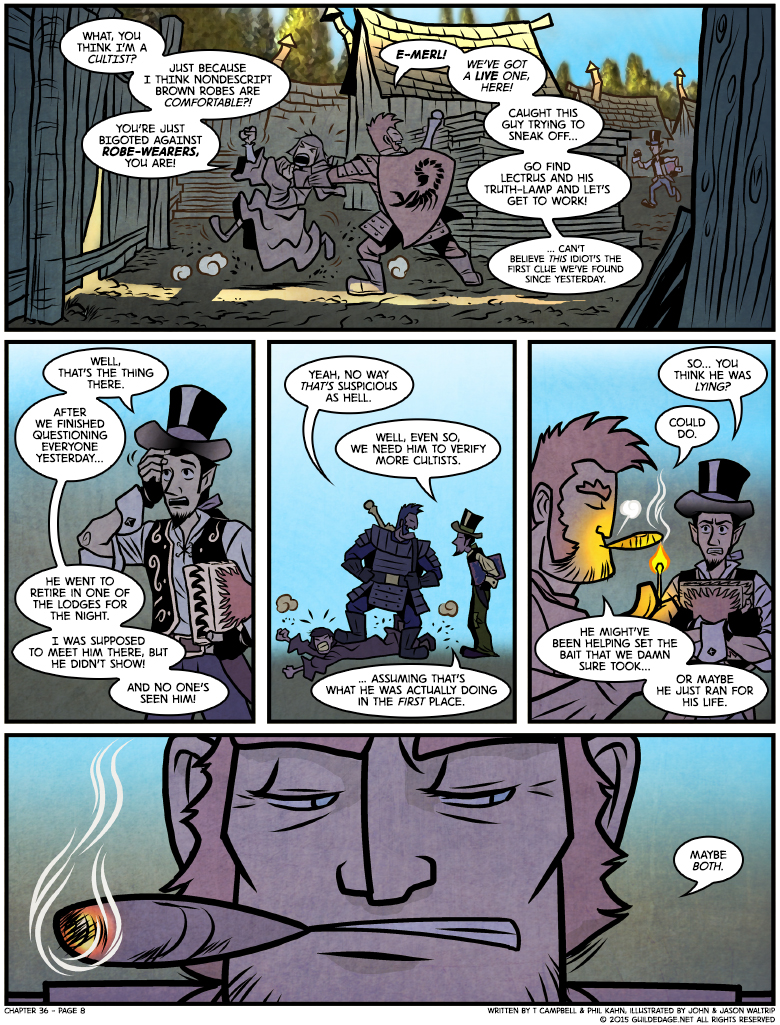Annotated 36-8
 We always felt there should be at least one mole in the group. Colonnus or Rabbit were the other major possibilities. Everyone else, we felt the readers knew too well. I mean, I guess we could’ve trampled your hearts even more and made it Braggadocio or Bert or Rendar, but they’d been central in key scenes where those other three hadn’t. I’d feel wrong about making such key supporting players secret Culitsts or Cultist allies and not dropping any hints beforehand. And Lectrus’ nature and powers made him a useful mole for us as storytellers.
We always felt there should be at least one mole in the group. Colonnus or Rabbit were the other major possibilities. Everyone else, we felt the readers knew too well. I mean, I guess we could’ve trampled your hearts even more and made it Braggadocio or Bert or Rendar, but they’d been central in key scenes where those other three hadn’t. I’d feel wrong about making such key supporting players secret Culitsts or Cultist allies and not dropping any hints beforehand. And Lectrus’ nature and powers made him a useful mole for us as storytellers.
This was as close as we got to resolving Lectrus’ part of the story until Chapter 50. At one point, Bandit was going to discover his treachery instead of crossing daggers with Brother Tom’s body: later on, he might’ve gotten a page or few panels showing his end at the hands of the Cultists he joined up with. But Flo maintained that we just had too much more important stuff to focus on.
So here’s the backstory that we could only imply in the text. Lectrus was a dedicated seeker of knowledge, arguably a compulsive hoarder of it. And the Cultists are keepers of forbidden lore. (I’m normally opposed to censorship, but if the book is something like Protocols of the Elders of Zion or How to Transform Anyone into a Crazed Murdering Monster in Two Easy Steps, there could be a defensible reason it’s restricted-access.) So Lectrus struck a deal with the Cultists, using his powers to guide Byron into Tom’s trap. The Cultists supplied some literature in exchange and promised more upon Byron’s capture. Although Lectrus did anticipate some kind of double-cross, the speed with which it arrived and the number of Cultists who enforced it caught him off guard. And for Lectrus the amoral adventurer, Lectrus the literature-lover, that was all she wrote.











Is it a club for a banned book of a banned club of books?
Hmmm…
No, it’s a club made of banned books. Ironically, because of its weird balance, you need high wisdom to wield it without penalties.
“Hey, this one guy we have used to 100% ID cultists has gone missing.”
“Ha! Knew he was cultist all along!”
“Or… The cultists killed him so we could no longer ID them so easilly…”
“No! Definitely he’s a cultist!
Those were roughly my thoughts: Why did nobody consider that Lectrus (who has been exposing the inhabitants of this village as cultists left and right) may have fallen victim to those same people? Definitely feels like Scipio is jumping to conclusions a little too fast (or based on some information which the readers don’t have, in which case he should have at mentioned some supporting facts).
To be fair: The information that got Byron into a trap was obtained with Lectrus’ help, and it was very probably a set-up, in hindsight. But then, Scipio himself was just as much involved with obtaining that information, while being in a room with Lectrus and the suspect, and it was him who informed the others, so …
Lectrus contributed his lamp which, as far as we know, can’t be controlled and works exactly as advertised as a lie detector.
That’s what bothers me with the whole thing: how little difference there is between “Lectrus was a cultist” and “Lectrus was a good guy who honestly fought the good fight, but whom the cultists succeeded in disappearing, which they had good reasons to do”. OK, he was a cultist, but what would he have done differently if he wasn’t? Been smart enough to ask the right questions? He wasn’t the only interrogator. Does that mean Scipio and E-Merl are cultists too?
This is a fair point and, IIRC, not something we really considered at the time, caught up as we were with the question of how much of Lectrus’ story to show. We liked the “who tests the tester” idea a little too much to really consider other interpretations.